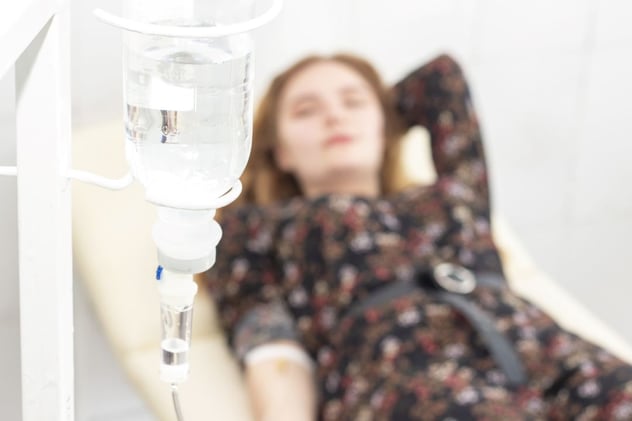
IV therapy is a widely used treatment in hospitals and rehabilitation facilities. It is a highly effective and efficient way of treating multiple conditions, including dehydration, severe infections, pain, and serious malnutrition.
During IV therapy, fluids or medications are introduced directly into the patients’ bloodstream via an IV needle inserted into a vein. If IV therapy is recommended as part of your rehabilitation, you may have questions about how it works and how it can help your recovery. In this article, we’ll address some of the most common questions patients ask us about IV therapy.
Q: When in IV therapy used to support patient recovery?
A: During patient rehabilitation, IV therapy has three frequent uses:
- To administer high doses of antibiotics - For patients recovering from critical infections, IV therapy may be the best way to quickly and safely introduce a sufficient quantity of antibiotics into the system.
- To treat dehydration - Many patients arrive in rehab with severe dehydration, and IV therapy can be the quickest way to reintroduce fluids and electrolytes into the bloodstream.
- To provide nutrition - For patients who are unable to eat, IV therapy may be used to treat or avoid malnutrition.
Q: Why is IV therapy used during rehabilitation?
A: IV therapy is recommended for patients during rehabilitation because it is an extremely efficient way of treating many common conditions. Because IV therapy introduces fluids or medication directly into the bloodstream, it bypasses the digestive tract. It is, therefore, more fast-acting than oral treatments, thus making it ideal for patients recovering from significant medical conditions.
IV therapy is also used during rehabilitation for patients who are too ill or weak to eat or drink. It is easily customized for each patient, allowing the patient’s physician to design a treatment program that is adapted to the individual patients.
Q: Who can benefit the most from IV therapy?
A: IV therapy is widely recommended for patients in rehab because it is an extremely safe, relatively non-invasive, and effective form of treatment. It is most often used with patients who are experiencing severe dehydration or malnutrition, for those recovering from severe infections such as MRSA, for patients recovering from serious wounds or major surgery, and for those with severe chronic pain.
Q: How does IV therapy help people recover from infection?
A: IV antibiotic therapy is recommended to help patients recover from very severe infections, including sepsis and microbial infections that don’t respond to oral antibiotics. Intravenous antibiotics can take effect more quickly than those taken by mouth. They can also be administered at a higher concentration, making them ideal for supporting recovery from severe infections, including MRSA.
Q: How does IV therapy promote recovery from chronic illness?
A: Combating chronic illness can be a lengthy and challenging process. IV therapy can be a useful component of a rehabilitation program for the chronically ill. For instance, IV therapy may help to reintroduce much-needed nutrients into your bloodstream, bypassing your digestive system. Vitamin-enriched IV fluids can also help support your immune system or liver function.
Q: Can IV therapy benefit patients with chronic pain?
A: Yes, IV therapy can be an excellent way to manage chronic pain. A medication such as ketamine or lidocaine is administered either via an IV or under the skin. These drugs block nerve receptors, thus potentially reducing chronic pain symptoms. In cases where another pain relief medication has not been effective, research confirms that IV infusions can be a good option for relieving, and in some cases even curing, chronic pain.
Q: What is IV nutrition?
A: If a patient is too ill or too weak to eat, or if their digestive system is too impaired, they may receive a treatment called Total Parenteral Nutrition (TPN). During TPN, nutrient-enriched fluids are injected directly into the patient’s vein with an IV. The fluid contains vitamins, minerals, glucose, salts, amino acids, and lipids. The patient can receive most of the major nutrients they need, even though they are unable to eat. The treatment may be recommended to prevent malnutrition in patients with serious gastrointestinal disorders, such as a bowel obstruction or ulcerative colitis. It is sometimes also used in very elderly patients who are suffering from malnutrition as a result of dementia or similar mental impairment.
Q: What are the risks of IV therapy?
A: In general, IV therapy is considered a very safe procedure, and has been widely used for many years. However, as with most medical treatments, there is some risk. Complications include bruising, infection at the injection site and inflammation of the vein (phlebitis). More serious risks, such as air embolisms, are extremely rare. Risks of treatment can be significantly reduced if the IV is administered by a trained medical professional.
Q: How often do I need IV therapy?
A: The frequency of treatment will depend on the condition that you have and the advice of your doctor. However, IV therapy is usually most effective when offered at repeated short intervals. At Rehab Select, all our facilities have a registered nurse on staff to supervise IV therapy treatment around the clock.
Q: Where can I get IV therapy to help support my rehabilitation?
A: There has been a lot of hype in the news lately about “drip bars,” which provide IV fluid infusions on demand. However, these are not recommended—as the Harvard Medical School notes, inserting an IV catheter is a skilled procedure that should be done by a trained medical professional. If you are advised to seek IV therapy as part of a rehabilitation program, you should choose a rehab facility that offers this service as an inpatient or outpatient program. In particular, look for facilities that offer round-the-clock RN support to ensure you can receive the treatment at short, regular intervals.
At Rehab Select, we offer IV therapy with round-the-clock RN coverage, meaning that we can offer multiple dosing schedules. Our rehabilitation specialists will work closely with your primary physician to effectively manage your IV therapy and other treatments during your stay with us. To find out more about our services, please visit our website, or click here to contact us.





